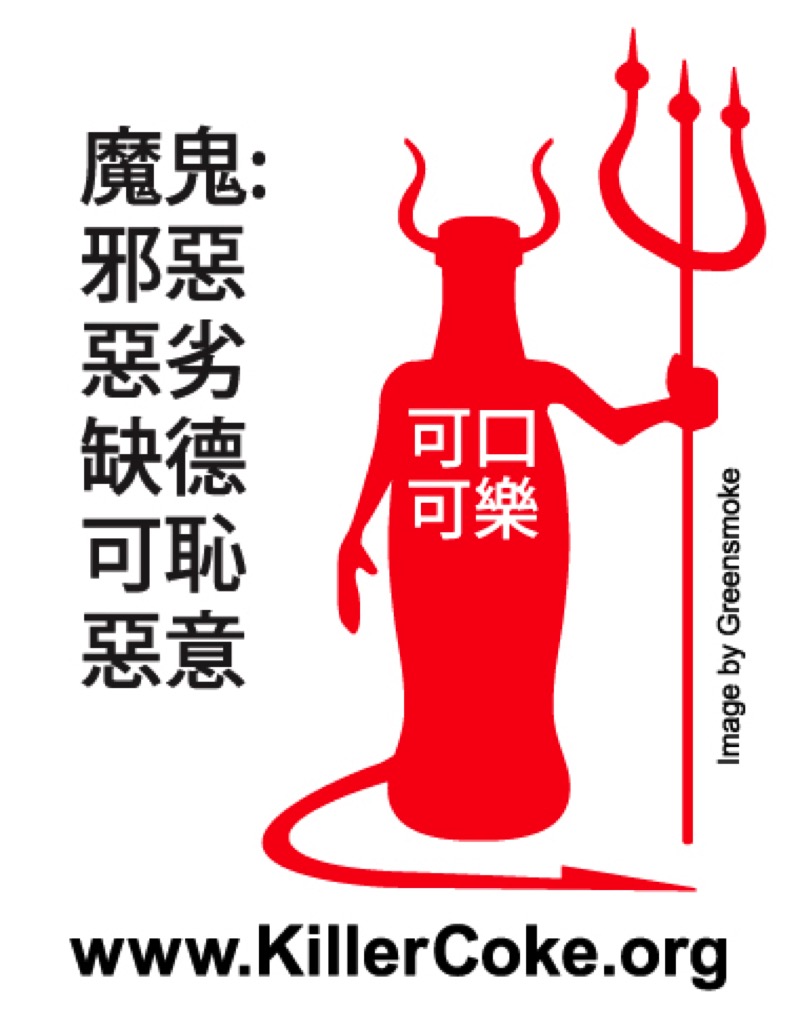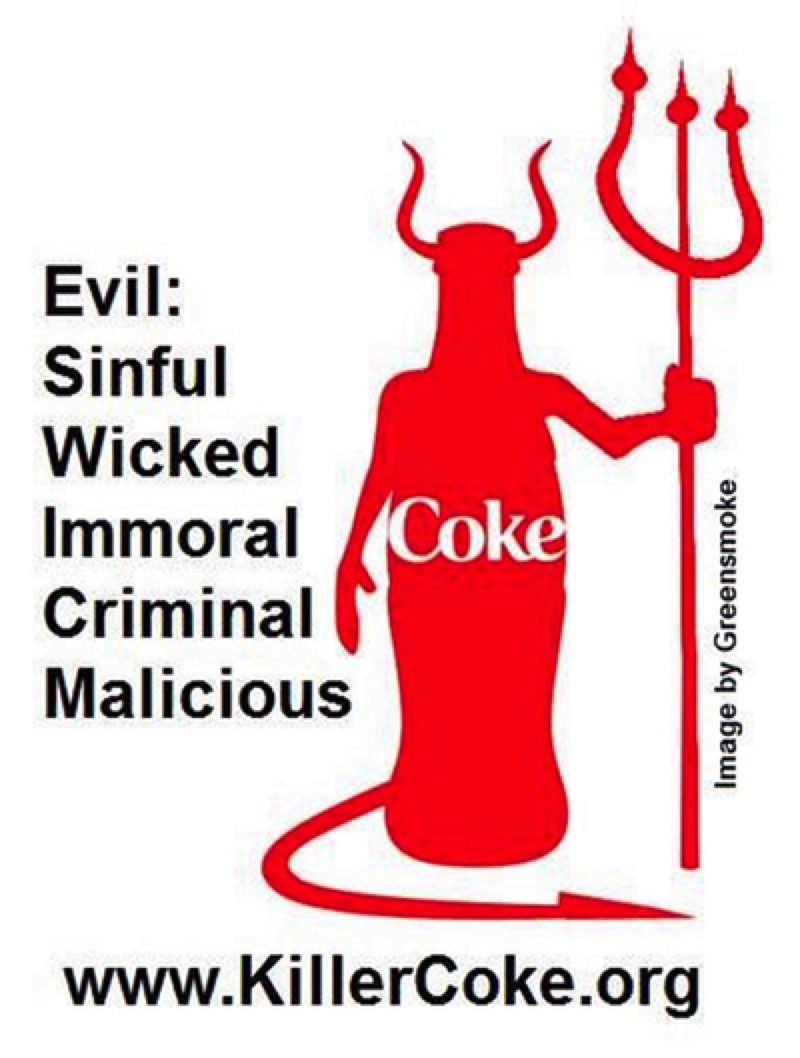Killer Coke Update | September 24, 2014
Campaign to Stop Killer Coke Makes Important Inroads Into China
Contents of the Newsletter
- Campaign Gets Warm Reception in China
- How Students and Other Activists in China Can Contact Us
- Ray Rogers Releases Open Letter to Concerned Citizens of China
- Will the Chinese People Turn the Tide Against Coca-Cola's Ravaging?
1. Campaign Gets Warm Reception in China
As Coca-Cola is facing growing opposition around the world, China has become the key to the Company's expansion strategy to sell its mostly unhealthy beverages. According to Coca-Cola, China's per capita consumption of Coke's sugar, chemically-laden drinks is 39 containers (based on U.S. 8 fluid ounce portions), whereas in Mexico it's a shocking 745 and in the U.S. it's 401.
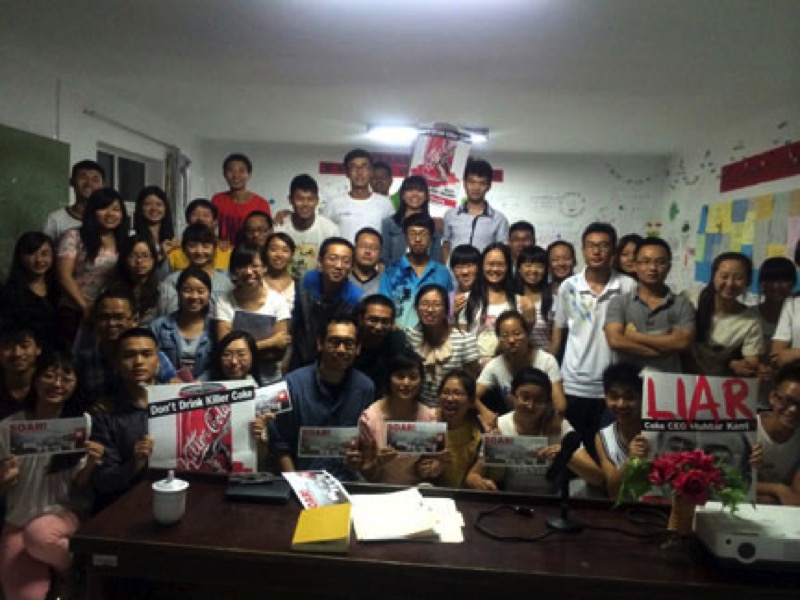
Students show support for SOAR and Campaign to Stop Killer Coke at a rural youth center near Beijing
While on a trip in August to visit youth, labor and women's groups and to learn about their work in local communities, Kai Yang, a representative of SOAR (Students Organizing Against Reynolds), traveled throughout China where he is working with different organizations, and promoted the Campaign to Stop Killer Coke in meetings and workshops at several stops. As you can see from the photos, Kai and the Campaign got a great reception from students and others.
The Reynolds Group, which also provides plastic containers for Coca-Cola beverages, has been targeted by SOAR for allowing and promoting horrible sweatshop conditions in factories of its Pactiv Corporation subsidiary which provides plastic containers for Walmart and Costco and to schools. Reynolds became a target initially because of the maltreatment of its largely women workforce at a Kearny, NJ factory. Long hours, mandatory overtime, alarming health and safety conditions, no provisions for ventilation or water in sweltering heat, and firing fed up, outspoken workers is Reynolds' legacy and the legacy of its New Zealand billionaire owner, Graeme Hart.
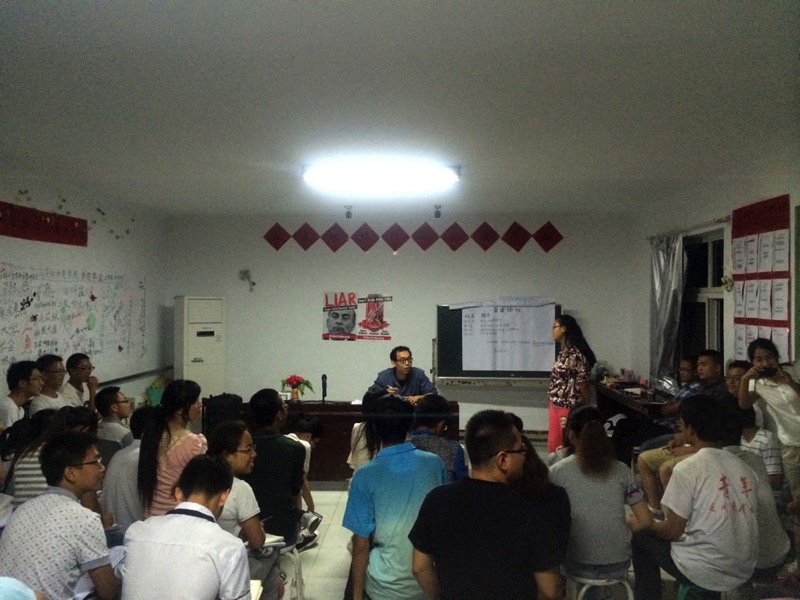
Kai Yang leading a workshop at a rural reconstruction center in the peripheral region of Beijing. The students there come from different parts of China.
The Campaign to Stop Killer Coke and SOAR have teamed up to organize workshops and involve students and others in China to research and monitor these companies and become activists to put a stop to Coca-Cola's and Reynolds' labor, human rights and environmental abuses that are harming the health and quality of life for so many.
2. How Students and Other Activists in China Can Contact Us
Concerned students and others in China should contact Kai Yang at kw_y03@yahoo.com for more information and advice and so we can report to a worldwide audience about their efforts. English speaking students and other activists can also contact Ray Rogers and the Campaign to Stop Killer Coke at info@KillerCoke.org. Those wanting Killer Coke or SOAR materials can go to The Coming Society at 2/F, FooTak Building, 365 Hennessy Road, Wan Chai, Hong Kong; Opening Hours: 1pm - 8pm (Mon - Sun)
3. Ray Rogers Releases Open Letter to Concerned Citizens of China
In an open letter released on September 24, 2014, to "Citizens of China Concerned About: Your Children's Health, Water Resources and Environmental Pollution," Ray Rogers, noted labor and human rights organizer/advocate and Director of Campaign to Stop Killer Coke/Corporate Campaign, Inc., warned the people of China to "Beware of The Coca-Cola Company. It represents American capitalism at its worst."
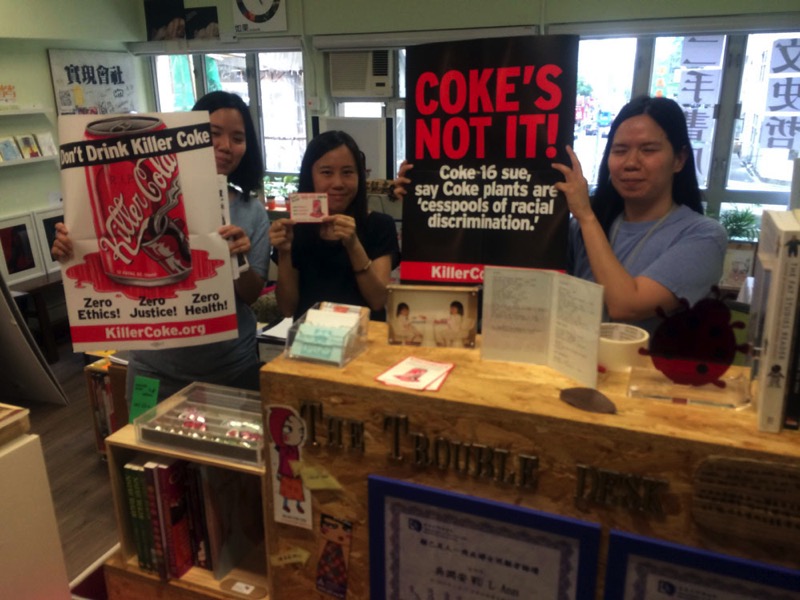
This bookstore space has a combination of three groups: The Coming Society, Local Research & The Trouble Desk. Stop Killer Coke & SOAR materials are being distributed there. Wan Chai, Hong Kong
"Coca-Cola," he says, "equates opening a container of Coke with family values and happiness in its advertising and claims it doesn't market to children. Nothing could be further from the truth...When Chinese consumers see Coca-Cola ads, they should think of a company that has inflicted great hardship and despair upon many people and communities worldwide and whose products should be avoided and boycotted."
He adds, "The company's main branding strategy is to attract and addict more children and youth on Coke. This will mean more sick kids and a big drain on China's healthcare system... Coca-Cola production facilities will assuredly diminish scarce water resources and pollute land and water needed for farming, drinking and sanitation as it has done on a grand scale in India and other countries. It will do everything it can to influence legislation for its own benefit even though harmful to the public interest and will avoid paying its fair share of taxes."
Mr. Rogers advises, "Protect your children and your country. Oppose new Coca-Cola factories. Ban Coke products from all schools, playgrounds and sporting events and tax sodas to lessen consumption."
4. Will Chinese Citizens & Students Fight Back Against Coca-Cola's Ravaging?
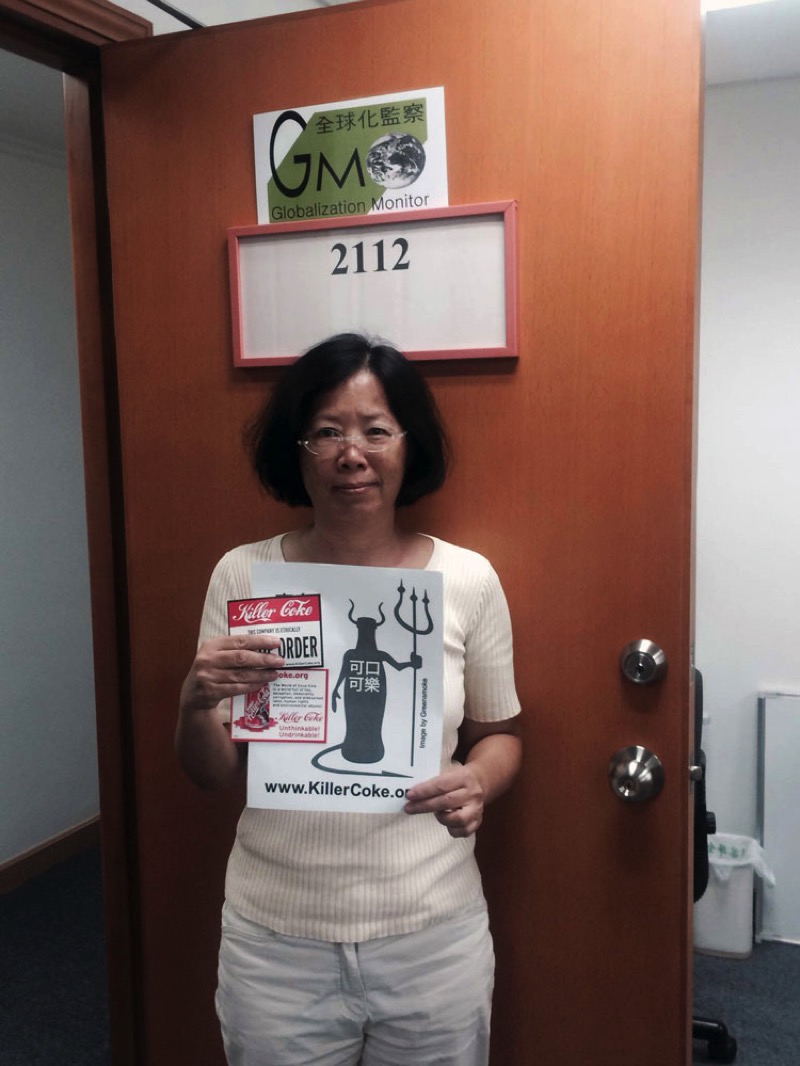
Global Monitor Executive Director May Wong, Hong Kong
In North America alone, Coca-Cola sales and brand name, each, are suffering enormous losses totaling many hundreds of millions of dollars due to the relentless public relations efforts of the Campaign to Stop Killer Coke and the targeting of college and university campuses and labor unions. Huge losses also continue to mount in India from forced shutdowns and ongoing protests there. Angry striking and campaigning Coke workers have put a big dent in Coke sales in Spain. And courageous union leaders and members of their families who continue to be victimized in Colombia and Guatemala by Coca-cola and its biggest Bottler, Coca-Cola FEMSA, keep fighting for justice and spur others to take action against Coke. [Click here to see more about Coke's Crimes in China.]
Several Chinese news outlets reported in August 2012, that Chinese consumers were "losing their trust" in the Coca-Cola brand. Coca-Cola ranked lowest in a Chinese customer satisfaction survey of 12 major beverage brands in China. The survey was conducted by the China Association for Quality and China National Customer Committee according to China Beverage News.
Key factors leading to the loss of trust in Coke's products included the company's usual arrogance in handling a scandal that erupted after 76,391 boxes of drinks that were distributed to Coca-Cola's Shanxi Province branch were found to be contaminated with chlorine. Coke's legal advisor in China finally came forward admitting that contamination occurred "when water containing chlorine used to clean bottles was mixed with water that ultimately went into beverages." A whistleblower in the Shanxi factory was the first person to bring the tainted products to the media's attention according to a May 2012 story in China.org.cn.
Coke first denied media reports of the chlorine contamination and later angered more people when it offered to replace products "but not to provide reimbursements to those who bought them." The Shanxi Bureau of Quality Supervision and Inspection and the Shanxi food-safety regulator stepped in to oversee that thousands of cases of Coca-Cola beverages were destroyed and to assure the company acted more responsibly before being allowed to resume production.
Another contentious issue is when Chinese learned, that after the Center For Science In The Public Interest exposed that caramel coloring, which gives Coke and Diet Coke the distinctive brown hue, contained chemical additives 2-methylimidazole and 4-methylimidazole which are found to be carcinogenic, Coke altered its recipe in the U.S. but not in China, to avoid having to put cancer warning labels on those beverages in the U.S.
Hopefully concerned citizens and activists can put the skids on Coke's expansion efforts in China and protect its communities, and most importantly its children and environment, from the ravages of Coca-Cola's greed, pollution and corruption.
